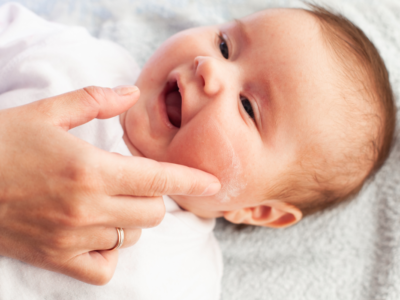At eight months old, your baby is two-thirds of the way into their first year earthside, and what seems like mere minutes away from taking over the entire household. Babies at this age are old pros at letting their needs be known, and a new, independent nature is probably starting to shine through. You might even be able to enjoy a few minutes of quiet time on your own, as your little one is probably able to entertain themselves long enough for you to make a fresh cup of coffee.
At eight months of age, your baby may…
Pull to stand. Walking is right around the corner, but before your baby can wander around the room, she will learn how to pull herself to a standing position. In the beginning, babies will use a couch or table to pull themselves up for a few seconds at a time. Make sure that all of your furniture and breakables are secure, because this step is just the start of a whole new level of mobility.
Have two front teeth. By now, most babies have at least two tiny front teeth poking through. Although some babies will rock the adorable gummy smile for a few months longer, your baby likely has a pearly white or two in there. Make sure to start brushing daily as soon as you see those first teeth appear!
Handle puree like a pro. Although purees are certainly still going to be one of the main aspects of your baby’s diet for quite some time, at this point, he can likely handle a large variety of textures and flavors. Try adding in some thicker and chunkier purees in delicious and new flavors. Your baby will probably also enjoy small bits of food that he can pick up on his own.
Perfect the pincer grasp. When you notice that your little one is bringing her thumb and index finger together to grasp tiny objects, you are seeing the pincer grasp in action. This extremely complex hand-eye motor movement is perfected during this month, and your baby can possibly pick up the tiniest crumb that she spots from across the room.
Sit and twist. Your baby has been sitting for weeks at this point, but now she can twist her upper body and then come back to her original position. She can also go from sitting to flat and back up to crawling with relative ease. Her strong core muscles and increasing balance make play time much more fun for everyone involved.
Test authority. He might understand what the word “no” means, but it doesn’t mean he is going to listen when you say it! Around this time, your baby will start to test authority, just a bit. Maybe pull on the dog’s fur after you tell him it isn’t ok, or look you in the eye and drop his bowl of food for the 20th time that afternoon. Every baby does it, and every baby eventually finds something else to do instead, so don’t fret about this stage!
Master the room. By eight months your baby has near adult-strength vision, and can spot a toy across the room with ease. During this month, not only will she spot the toy, but she will make the connection that she can move her body over, grab the toy in her hand, and play with it. Both a cognitive and physical development signaling that your child is becoming self aware and more aware of her surroundings.
Toss and throw. A toy, a spoon, a diaper… all fair game for a baby who is just now realizing that she can throw things (and get a reaction). Keep fragile items well out of reach and watch with wonder as your little one perfects the overhand toss!
Adore a lovie. At this point, your child might start to take interest in one particular stuffed animal or blanket. If that seems to be the case, try to purchase a backup or two for the inevitable day that his classic lovie is in the wash during bedtime. Babies can quickly become attached to these favorite items, and need them to sleep every night!
Anticipate daily routines. While she may seem surprised when it is time for bed each night, your eight month old is just beginning to understand and anticipate daily routines. She likely now knows that a crib means it is time to sleep, or that when she is popped into a high chair, food will be coming soon.
This month marks the start of your baby becoming self-aware. As empathy begins to appear and stranger and separation anxiety intensify, you might be wondering what you can do to make these transitions a calm experience for everyone. Since your baby is just starting to learn routines and understand what’s going to happen each day, try to keep up with your daily schedule, even when emotions seem to be on high alert. By respecting routines and reaching to achieve a calm atmosphere at home, your baby will likely meet these new milestones with pride and glee!



